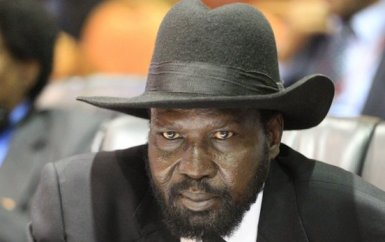South Sudan president solicits immediate deployment of regional forces
May 24, 2014 (JUBA) – South Sudanese president Salva Kiir has called for the immediate approval and deployment of a regional deterrence and protection force to end ongoing violations of the cessation hostilities agreement signed with his former deputy turned rebel leader, Riek Machar.

Accompanying Kiir is a minister in his office, Awan Guol Riak, and several military officers and presidential aides in a trip many say would be an opportunity for the South Sudanese delegation to engage with other African leaders.
“This is an important function for us to attend because our delegation headed by the president will hold sideline meetings with other leaders and representatives of different governments from across the continent and the world,” Riak told journalists on Friday at Juba international airport prior to departure.
“It will be an opportunity for us to solicit support from these leaders to settle this current conflict. Most of the leaders attending the inauguration of the president, Jacob Zuma, are people with especial attachment or connection with our problems,” the minister added.
A presidential aide also accompanying president Kiir told Sudan Tribune on Saturday that more than 40 foreign leaders were in attendance at the ceremony, including the presidents of Nigeria, Uganda, Zambia, Zimbabwe, South Sudan and Somalia, as well as the vice-presidents of several African nations.
The aide, who spoke on condition of anonymity, confirmed the president had held sideline meeting with a number of key African leaders in which he stressed that pro-Machar rebel forces would continue to commit ceasefire violations.
“He (Kiir) made it abundantly clearly that the rebels of Riek Machar would never respect [the] cessation of hostilities [agreement] unless a deterrence and protection force is deployed to secure and provide protection during the movement of the monitoring and verification team to track down and report independently the side violating or failing to implement the agreement,” the aide told Sudan Tribune on Saturday from Pretoria.
The aide said president Kiir had also held talks with Zuma during with he asked for the South African president’s support at the African Union to consider deployment of a foreign force.
REBELS BLAMED FOR VIOLATIONS
The calls for a regional protection force come amid accusations of ongoing violations of the ceasefire agreement by Machar-led forces.
In a public address in Jonglei state capital Bor on Thursday as part of commemorations marking the inception of the national army (SPLA), governor General John Kong Nyuon provided details of a series of alleged attacks on government forces in Upper Nile and Unity states since the signing of the peace pact earlier this month.
“The rebels made several attacks on SPLA positions since then. One in Rubkona, killing 27 SPLA soldiers,” he said.
“They made another attack at Kilo 50, between Tharjath and Bentiu, and another one in eastern Upper Nile, Maiwut, and another attack in northern part of Renk,” he added, saying attacks remained ongoing.
He claimed monitors, who were deployed in the field last month, have no facilities to verify who is really attacking who.
“If you sit in one place, how will you know what is happening there if you don’t have facilities to go there [and the] facilities to get information?” he said.
Nyuon also claimed that rebel forces were deliberately provoking further clashes.
“How can two parties violate [the] ceasefire? It must be one party. If one doesn’t begin [the] other one will not do anything,” he said.
Escalating political tensions within South Sudan’s ruling SPLM party turned violent in mid-December last year, sparking an armed conflict between government loyalists and Machar aligned rebels.
The crisis has led to massive displacement across the country and reignited tribal tensions, with both sides accused of committing atrocities.
A renewed ceasefire deal signed on 9 May in Ethiopian capital Addis Ababa following a face to face meeting between Kiir and Machar – their first since conflict erupted, has failed to stem violence on the ground.
The Intergovernmental Development Authority on Development (IGAD), which is mediating peace talks between the warring sides, is pushing for the deployment of a regional protection force to enforce the ceasefire deal.
The US has also called for a quick deployment of African forces, saying it was key to ensuring a real cessation of hostilities.
The proposed deployment has been rejected by Machar, who claims it would widen and regionalise the conflict.
(ST)
